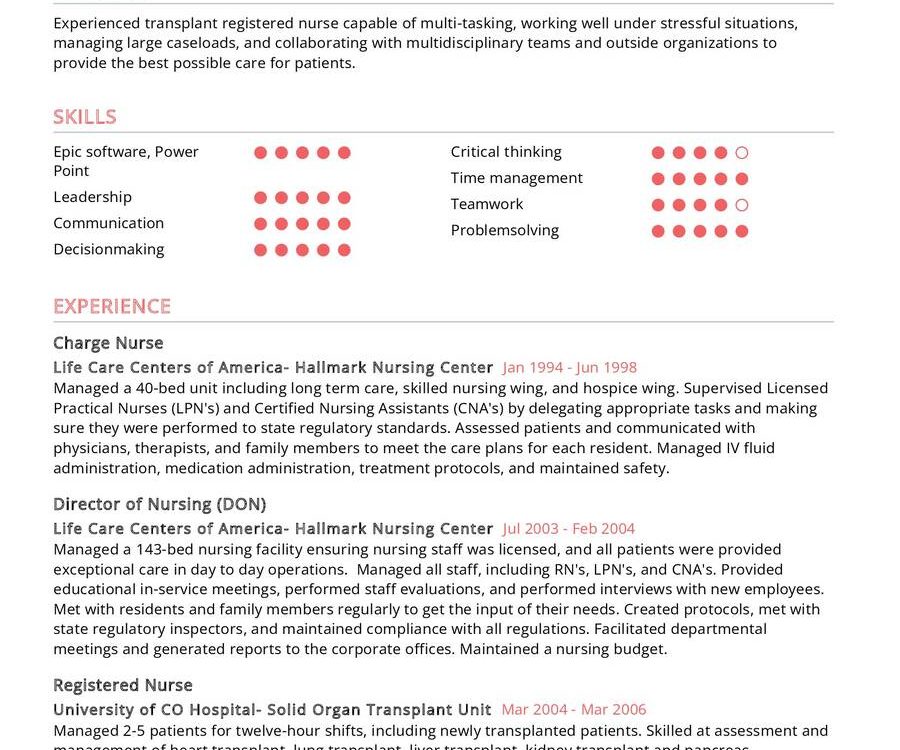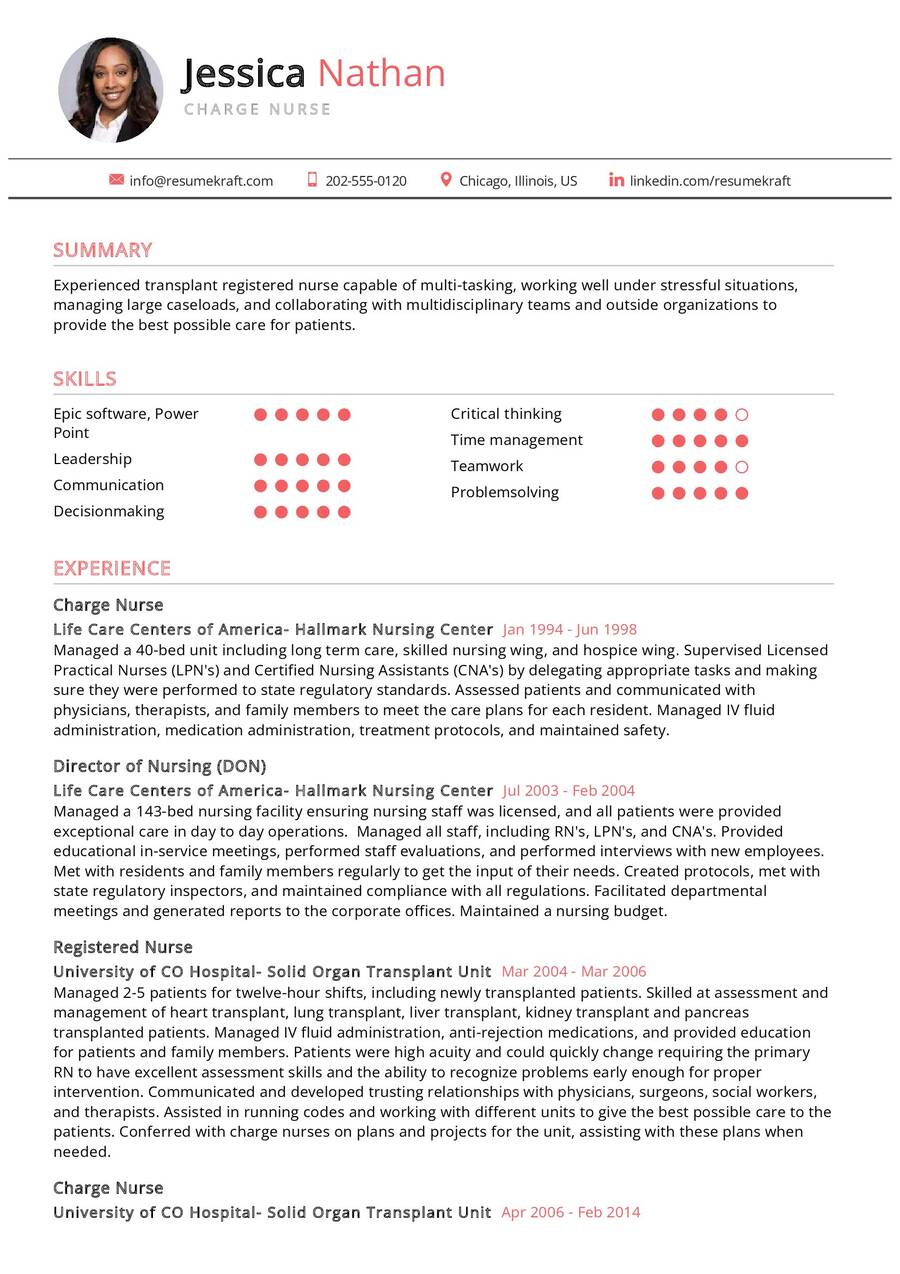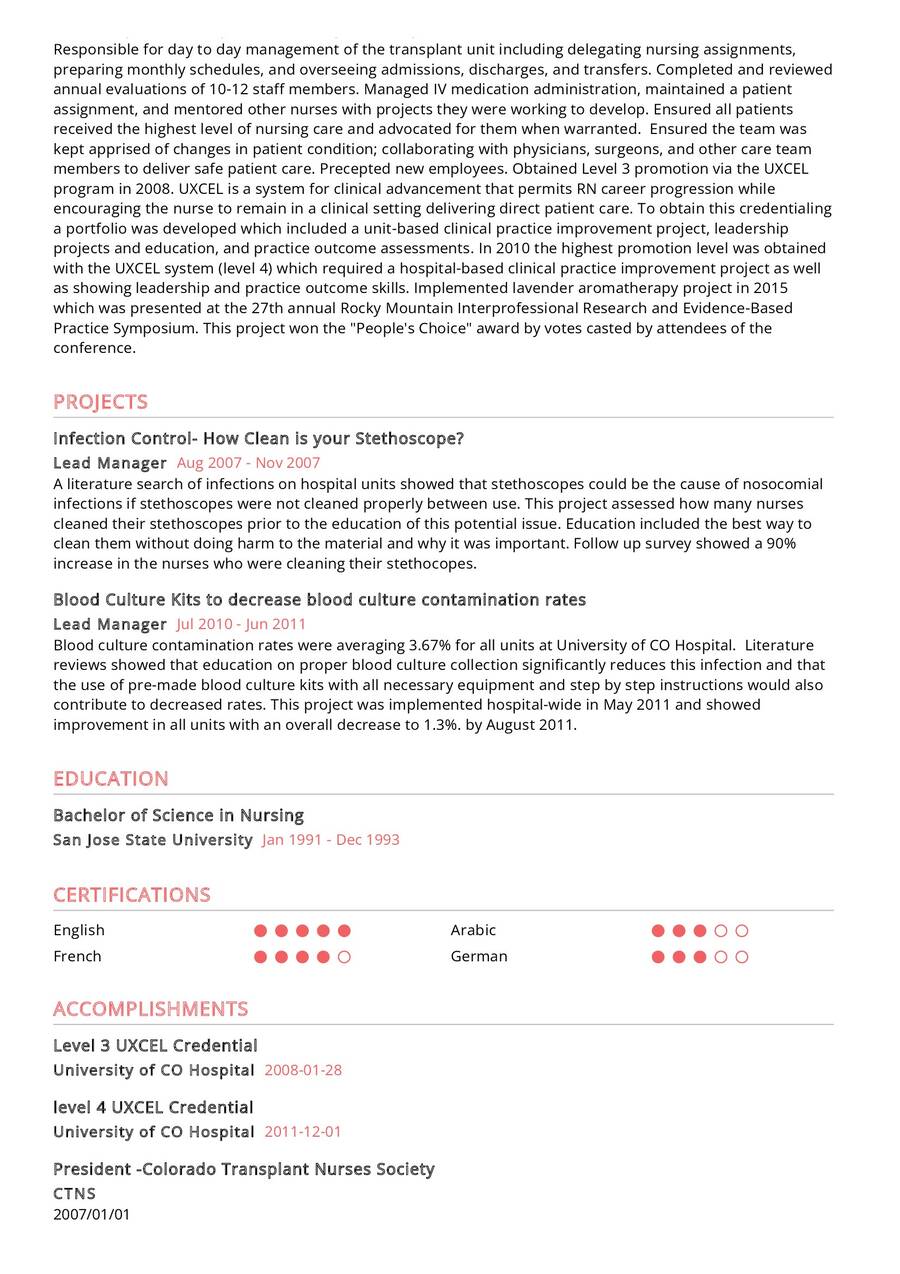Exploring the Role of a Registered Nurse
As the healthcare industry continues to evolve, the role of a Registered Nurse (RN) remains crucial in providing compassionate and skilled patient care. This article delves into the multifaceted responsibilities, qualifications, and skills that define the position of a Registered Nurse, emphasizing the importance of showcasing these aspects in a compelling CV.
Registered Nurse Job Requirements
Embarking on a career as a Registered Nurse requires meeting specific qualifications and acquiring a diverse skill set. Let’s explore the key requirements for this role:
- A Bachelor’s degree in Nursing, showcasing a solid foundation in the field of healthcare.
- Licensure as a Registered Nurse, demonstrating compliance with regulatory standards.
- Clinical experience in various healthcare settings, such as hospitals, clinics, or long-term care facilities.
- Proficiency in patient assessment, care planning, and implementation of nursing interventions.
- Excellent communication and interpersonal skills, essential for effective collaboration with patients, families, and healthcare teams.
- Adaptability and resilience, crucial in handling the dynamic and sometimes challenging nature of healthcare environments.
Additionally, pursuing certifications in specialized areas of nursing, such as critical care or pediatrics, can enhance your CV and marketability.
Responsibilities of a Registered Nurse
The role of a Registered Nurse is diverse, encompassing a range of responsibilities that contribute to the overall well-being of patients. Let’s examine the core duties that define this vital healthcare position:
- Conducting comprehensive patient assessments to identify healthcare needs and develop individualized care plans.
- Administering medications and treatments, ensuring adherence to established protocols and maintaining accurate patient records.
- Collaborating with interdisciplinary healthcare teams to provide holistic patient care and support.
- Offering patient education on health conditions, treatments, and preventive measures.
- Advocating for patients’ rights and ensuring their comfort and safety.
- Participating in continuous professional development to stay abreast of evolving healthcare practices and technologies.
Each responsibility highlights the dynamic nature of the role, emphasizing the need for effective communication, critical thinking, and clinical expertise.
Registered Nurse CV Writing Tips
Crafting a compelling CV is essential for standing out in the competitive field of nursing. Consider these tips to create a resume that effectively communicates your qualifications and experiences:
- Highlight your clinical experiences, emphasizing the diversity of healthcare settings you’ve worked in.
- Showcase specific patient outcomes or achievements that resulted from your interventions.
- Include relevant certifications, such as Advanced Cardiovascular Life Support (ACLS) or Pediatric Advanced Life Support (PALS).
- Detail any leadership roles or projects you’ve undertaken, demonstrating your ability to contribute to healthcare teams.
- Personalize your CV for each application, aligning your skills and experiences with the specific job requirements.
Your CV is a reflection of your dedication to patient care and your commitment to ongoing professional development.
Registered Nurse CV Summary Examples
Your CV summary is the opening statement that introduces you to potential employers. Craft a powerful summary that encapsulates your nursing journey and the value you bring to the healthcare team:
- “Compassionate and highly skilled Registered Nurse with five years of diverse clinical experience, dedicated to providing patient-centered care and contributing to positive healthcare outcomes.”
- “Detail-oriented and adaptable Registered Nurse with a focus on evidence-based practice, committed to delivering quality care and fostering a supportive healthcare environment.”
- “Experienced Registered Nurse specializing in critical care, adept at managing complex patient cases and collaborating with multidisciplinary teams for optimal patient outcomes.”
Your CV summary sets the tone for the document, offering a glimpse into your nursing expertise and professional approach.
Building a Strong Experience Section for Your Registered Nurse CV
Your experience section is the core of your CV, providing a detailed narrative of your nursing journey. Consider these examples to effectively communicate your experiences:
- “Led a team of nurses in a busy emergency department, achieving a 15% improvement in patient triage times and overall satisfaction.”
- “Implemented a new protocol for medication administration, resulting in a 30% reduction in medication errors on the nursing unit.”
- “Collaborated with healthcare educators to develop and implement a comprehensive diabetes management program, improving patient outcomes and education.”
Each experience highlights your contributions to patient care, team collaboration, and continuous improvement in healthcare delivery.
Education Section for Your Registered Nurse CV
Your educational background is a key component of your CV, showcasing your foundational knowledge and commitment to ongoing learning:
- Bachelor of Science in Nursing, XYZ University, a comprehensive education in nursing principles and practices, 2015.
- Registered Nurse Licensure, State Board of Nursing, demonstrating compliance with regulatory standards, 2016.
- Certification in Critical Care Nursing (CCRN), showcasing specialized expertise in critical care, 2018.
Your education section validates your qualifications and positions you as a knowledgeable and skilled healthcare professional.
Key Nursing Skills for Your CV
Your skill set as a Registered Nurse is diverse, encompassing both technical and interpersonal abilities. Let’s outline the essential skills that should be highlighted in your CV:
Soft Skills:
- Compassion and empathy, vital for establishing rapport with patients and providing holistic care.
- Communication and teamwork, essential for effective collaboration with healthcare teams and interdisciplinary professionals.
- Adaptability and resilience, crucial in navigating the dynamic and sometimes stressful healthcare environment.
- Critical thinking and problem-solving, integral to making sound clinical judgments and decisions.
- Attention to detail, necessary for maintaining accurate patient records and ensuring the safety of healthcare interventions.
Hard Skills:
- Clinical expertise, a deep understanding of nursing principles, procedures, and evidence-based practices.
- Proficiency in electronic health records (EHR) systems, ensuring accurate and timely documentation of patient care.
- Knowledge of specialized nursing procedures, such as administering intravenous medications or managing ventilators.
- Patient education skills, the ability to convey complex medical information in an understandable manner.
- Advanced life support certifications, demonstrating readiness to handle critical and emergency situations.
Your skills showcase your ability to provide high-quality patient care and contribute to the success of healthcare teams.
Common Mistakes to Avoid When Writing a Registered Nurse CV
When crafting your CV, it’s crucial to avoid common pitfalls that can hinder your chances of securing your desired nursing position. Here are some mistakes to steer clear of:
- Using generic statements that don’t highlight your unique contributions to patient care and healthcare teams.
- Omitting specific achievements or outcomes from your clinical experiences, providing a lack of depth to your narrative.
- Underestimating the importance of a well-crafted cover letter, a missed opportunity to express your passion for nursing and align your skills with the job requirements.
- Overloading your CV with technical jargon without contextualizing its relevance to patient care and positive outcomes.
- Failing to proofread your CV, which can create a negative impression of your attention to detail and professionalism.
Avoiding these mistakes ensures that your CV presents you as a competent and dedicated Registered Nurse.
Key Takeaways for Your Registered Nurse CV
As you conclude your journey of crafting an impactful Registered Nurse CV, keep these key points in mind:
- Emphasize your diverse clinical experiences and their impact on patient care and outcomes.
- Highlight your specialized skills and certifications, demonstrating your commitment to continuous learning and professional development.
- Detail any leadership roles or projects that showcase your ability to contribute to the success of healthcare teams.
- Include a section on your commitment to ongoing learning, showcasing any additional courses or certifications relevant to nursing.
Finally, feel free to utilize resources like AI CV Builder, CV Design, CV Samples, CV Examples, CV Skills, CV Help, CV Synonyms, and Job Responsibilities to create a standout application and prepare for the Registered Nurse job interview.
Armed with these insights and tips, you are now ready to craft a CV that is a true reflection of your nursing journey, your skills, and your commitment to providing excellent patient care. Best of luck!



